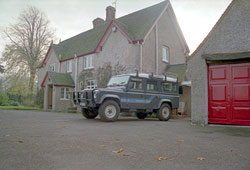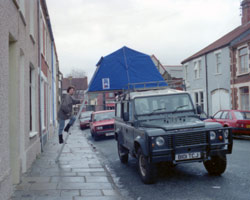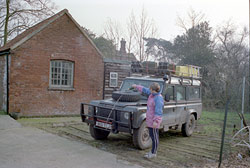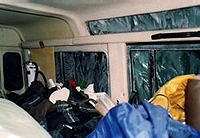In and Out of Africa
The Invitation
After programming computers for nearly a decade Fiona Lewis was ready for a change. There was talk of overseas travel but I was still fairly happy programming computers (it had only been five years for me). I was also in the middle of a lucrative and interesting software contract. Such things are extremely rare and should not be abandoned lightly. "Maybe when my contract ends", I suggested, expecting to be offered an equally lucrative permanent position at the end of the contract. Then the invitation came.
Peter Winterburn and Michelle Jacobs
request the presence of Derek and Fiona
at their Wedding.
This particular wedding happened to be 18 months and half a world away in South Africa. Due to a childhood pact (well adolescent really), if I could get there I would be best man. There was still plenty of time to make our decisions, which revolved around a nice simple plane ride. Then, due to the overzealous accounting practices of my employers and my own grave error in finishing the software project on time and to specification, I found myself without a job. The following hours were full of the kind of words they don't include in the better dictionaries.
By the next morning we had both calmed down and a couple of strange decisions had been made. We were going to Pete's wedding and we were going overland.
Several long distance phone calls, a couple of books (about Landrovers and Africa), some other sundry items and three months later we boarded a plane bound for England and adventure. Nothing anyone could have told us at that point would have prepared us for the events to come and the changes that would happen to us both.
When we landed at Heathrow the trip showed the first signs of the almost military smoothness and precision we would come to expect. There was no one at the airport to meet us. Partly because we had told people not to, but mostly because we had the days mixed up and arrived a day early. Luckily we managed to hire a car successfully and drove away from Heathrow along distressingly narrow English roads. After several miles the traffic finally reached a speed which allowed me to discover the horrible noise where fifth gear would normally be. Fiona gave me her "You should be able to change gear by now" look. "It's not me", I said indignantly. I performed a simple test and the noise was still there. We took the car back and exchanged it for another one, delaying us for about an hour. The implications of similar mechanical failure in the middle of Africa didn't even cross our minds.
Within a few days we were immersed in the realities of adventure preparation. Find a vehicle, select equipment and sort out the seemingly endless stream of visas and documentation. We needed to find a vehicle very quickly and began our search for a diesel Landrover 110. I could tell you this was a decision based on extensive research. I could go into great detail about the benefits of permanent four wheel drive, coil springs, largest payload of any vehicle in its class, etc. All this is true (and more). However, my childhood days living across the road from the Landrover factory in Solihull probably had more than a passing effect on the decision.
 |
| The Truck - somewhere in England |
|---|
Soon we were the proud owners of an Elephant grey Landrover Diesel County 110 - 12 seater station wagon - Registration B101TCJ. This looked quite at home parked outside my parents' house. They live in a part of rural Britain where every third vehicle is a Landrover and their house was conspicuous for its lack of one. I had always wondered why everyone in the area parked their Landrovers outside. I thought this was some form of snobbery until I made an important discovery. A Landrover simply doesn't fit into a conventional garage, or anything smaller than a barn for that matter. The implications of this became clear as I began preparing it for the journey ahead without shelter, during the onset of a British winter. A winter destined to be described using phrases like 'since records began' and 'in living memory'. I had expected to learn about extreme heat on this trip. I was to learn several new definitions of cold before we even touched the shores of Africa.
 |
| The Truck - in Cardiff |
|---|
Our first outing in the Landrover was a trip to Wales, a distance of around 200 km, to see some of Fiona's relatives. After about 30 km the engine died. "What's wrong", said Fiona. "The engine's stopped", I reply, "It felt like an electrical fault - but a diesel doesn't have an ignition system to fail". I pull over to the side of the motorway. It was starting to rain, cars were streaming past at 160 km/h. I looked under the bonnet in utter confusion. This was the first diesel engine I had ever seen. I used the convenient emergency phone and waited for the AA man to arrive, along with my first misgivings about the miles ahead. If we can't even get to Wales...
There was indeed an electrical fault. A wire had fallen off the bit which cuts off the fuel supply when you turn off the engine. The AA man fixed this problem within seconds. For some reason this didn't make me feel any better.
The three months in England passed quickly. We kept ourselves busy with trips around the country to get Visas, equipment, advice and an unbelievable list of injections. We didn't know anyone who had done this type of trip before, which made the early stages of preparation quite difficult. Many of our friends gave invaluable help with parts of the preparation and surprisingly every one had heard of the mythical 'safari equipment place under a railway arch in London'. Unfortunately no one could tell us where it was! This became our own personal 'holy grail'. We knew that it existed somewhere in the uncharted wastes of London's industrial heartland. No amount of research revealed the location of this Safari Shangri La, only fate could lead us to it and, if we ever found it, we would probably never be able to find our way back later.
Our quest took us all over the country, from Wales to Devon, from Lincoln to Nottingham. We found many places which had one or two of the things we wanted but nowhere which had it all. The only item which they all seemed to have was the humble Jerry can. Invented by the German Afrika Corps in the second world war to carry fuel safely around the desert, no trans Africa trip would be complete without a few strategic Jerry cans on the roof rack. They varied in price from 8.50 GBP to 25 GBP and this allowed us to formulate the 'Jerry Can Comparison Index'. If any shop scored more than 12 on the open ended JCC Index we assumed that everything else they sold was grossly overpriced too. We would wander around the shop for a while and then "How much are your Jerry cans?", "Er, fifteen pounds, is there anything else we can help you with", "Well we're looking for equipment for a trip across Africa", "Oh, that's interesting, I always wanted to do that. We haven't much in that line here I'm afraid but I think there's a place somewhere in London that sells all that kind of stuff", "Oh yes, do you know where it is?", "Er, Under some railway arches I think".
After several weeks of this we had given up on finding Shangri La and had bought most of the essential equipment. The most important item left to get was a water filter. There only seemed to be two suppliers of what we wanted, one was in Yorkshire and the other in London. There was one last visa to get from London so London it was. We followed the directions to Bethnal Green, deep in London's industrial heartland, drove under the railway and turned left by the fence. There in front of us, shimmering slightly like a mirage in the cold winter air, stood several Landrovers nestled together for warmth under two railway arches. This was it, the lost safari equipment supplier, Shangri La at last. Inside was an Alladin's cave of equipment, including even the hard to find items. They had everything from puncture repair kits to fully safari prepared Landrovers. They scored about 9 on the JCCI and were the only place who had genuine NATO plastic water cans. Eyes gleaming we began a minor spending spree, only to find that they wouldn't accept personal cheques or major credit cards. Perhaps this is not too surprising when you realise that their clientele could be in the Sahara before the cheque cleared! We walked around the corner to an autobank machine, withdrew a few hundred pounds and walked back unconcerned, our pockets barely bulging.
In the months since our arrival there had been increasing military activity in the Persian Gulf. Saddam Hussein had invaded Kuwait and many people seemed rather upset by this. There was a general air of tension and paranoia and many people were changing travel plans through fear of terrorist attacks on airlines. We received our Carnet (a kind of customs 'passport' for the truck) and Kenya had been omitted by mistake. Two weeks later when we received the replacement it was no longer valid for Egypt or Turkey. In the Arab world tempers were running as high as paranoia was in the west. We needed Visas for Algeria, a country whose sympathies did not lie with those countries gradually moving soldiers and missiles onto Arab soil. Fiona's visa for a New Zealand passport cost 5 GBP and was approved straight away. The official looked at my British passport and gently shook his head. My visa cost 35 GBP (non refundable) and required an interview in two days time. There was no alternative route and we were repeatedly told that British citizens weren't being granted Visas even after the interview. This was now the most important interview of my life. If my application was rejected the trip was over before it had begun. So I put on my best suit, removed my ear ring and headed apprehensively for London. The coach got closer to the City and my nervousness grew. As I walked the last kilometre from the tube to the embassy my mind was a blur with questions and answers "Why do you want to visit Algeria at this time?". I felt sure that "Because it's there" would not be the right thing to say. In spite of the winters cold I was sweating by the time I arrived at the embassy. As I walked up to the counter the same official looked up briefly and said 'congratulations, enjoy your holiday' and handed over both the passports and visas. I stared in disbelief for a moment and took the passports. "Thanks, I will".
As soon as I got out of the building I opened up the passport, still not quite believing that I had got the visa. There on the second visa page was an Algerian visa. Directly opposite, on the first page was a prominent (and rather attractive) New Zealand residence permit. Two days before he had started shaking his head when he saw this, a gesture I now realise means 'Yes'. I am sure this is what made the difference. New Zealand, after all, wasn't massing troops to 'liberate' Kuwait.
Finally, after much invaluable help from friends and family, we were ready to go. Or rather we'd had the going away party and told everyone we were leaving on Sunday and leave we would, ready or not! Saturday night was full of nervous sleeplessness and an early start to finish preparing the vehicle. All too soon it was 17:00 hrs and time to go. For the first time the truck was sitting low on its springs, fully laden with new and untested equipment. We turned out of my parents' drive into the dark winters evening, waving over the hedge as we went. With one last beep of the horn the truck moved sluggishly down the hill to the motorway. Although I have driven down that hill many times before this time was like a different road. The first mile of thousands to come, were we doing the right thing? Were we ready? Was it too late to turn back? I turned onto the motorway and filled the tank with diesel. One last look up at the lights of my parents' house on the top of the hill and we began the drive south. The first and perhaps the longest mile over, there was no turning back now. Apprehension turned to excitement as we drove steadily at 80 km/h towards Africa.
The first stop was my brother's flat in Oxford. He was coming with us as far as Spain where my sister lives. I was very tired and hungry by the time I drove under the familiar low arch into the courtyard. A loud screeching, tearing sound reminded me that a Landrover with a laden roofrack is much taller than the average car. The roof rack was mangled and hanging loosely half a metre behind the truck. The brick work was still intact, with a new scar to add to its collection.
 |
| Launching the Truck |
|---|
The next morning a large hammer, brute force and a lot of ignorance were inflicted on the bent roofrack and soon it was as good as new. Flat Champagne was poured over the bull bars and Fiona said something about blessing this truck and all who sail in her. Once again we were on our way.
 |
| Ice on the inside of the windows Somewhere in France |
|---|
Our next test was negotiating Paris in a right hand drive Landrover. Even Paris taxi drivers respect a good pair of bull bars and everyone scattered from our path leaving a Landrover sized gap for us to drive in. We found the Niger embassy where we needed to get yet more visas. The embassy was warm and the African staff seemed out of place in Paris in the winter. We headed off through icy cold mountains to Spain and (we hoped) warmth.
As we crossed the border into Spain the sun came out and the layers of French ice began to peel off the spare tyre on the bonnet of the truck. Things were starting to look better as we pulled into Place del Conde, Reus and parked opposite my sister's flat. The evening was spent drinking beer and anis del mono and catching up on years apart. We hardly noticed the images of SCUD missiles and answering patriots streaking through Israeli skies on the TV in the corner.
The morning sun was warm and I felt good as I went down to the truck to get some clothes. 'That's strange', I thought, 'I'm almost certain I locked the door last night'. In fact I had locked the door as well as the specially fitted padlocks. These proved no obstacle for the average Spanish thief. Neither did the 'hidden' locked compartment or the locked cashbox within it. We had lost nearly 1000 GBP in cash (much in small denomination US dollars) and 2000 GBP in travellers cheques. Even worse we couldn't find the Carnet or our vaccination certificates without which we couldn't continue. The short wave radio was also missing. The idea of driving into several potential war zones without the reassurance of the BBC world service filled me with dread. Fiona came down and saw the damage. She used some bad words very loudly, remarkably similar to the ones I had used myself only a few minutes earlier. Fortunately the only person within hearing distance who could understand them was my sister. We searched the square and found some of our possessions in the litter bin. Then came our first stroke of luck for days. The Carnet (and presumably all the other papers) had been thrown under the truck. The vaccination certificates had blown away but the Carnet was still there. We still had our passports, camera and some cash which had been taken into the flat. There were no finger prints. "They must have used gloves", Said the policemen. "A bit like these". He held a surgical glove in his hand, one of the bag full we carried to protect us from nasty diseases when performing first aid in Africa. Over half of them were missing.
That evening the image of incredibly clever smart bombs entering bunkers and wreaking havoc within and the talk of allied invasion of Iraq filled us with foreboding. After the last few days thoughts of giving up began to enter our heads. On the beach front were some New Zealanders in a campervan. They had been touring Morocco but had left rapidly when the locals became very angry, throwing stones at tourists and rioting. Things were going from bad to worse. While we waited for replacement travellers cheques and vaccination certificates to arrive the news from the Gulf and Morocco continued to deteriorate. There was an alternative ferry route directly to Algeria which would avoid the stone throwing in Morocco. Then we heard they were rioting in Algiers. We telephoned the British Embassy in Algiers, explained what we were doing and asked how safe it is. "I advise you to make other travel arrangements", he said. "Is it really as bad as that", we asked. "I advise you to make other travel arrangements", he said again.
With grim determination and a refusal to be beaten we booked passage on a ferry to Algiers. We would make our final decision at the port in Alicante. There was now a week to wait so we decided to get our Nigerian Visas in Madrid. Contrary to what they had told us on the telephone the embassy in Madrid only issues Visas to Spanish residents. What else could go wrong...
It wasn't long before we found out. Leaving Madrid something strange happened as I changed into fifth gear. The was no noise this time. Instead the clutch slipped ever so slightly. Fiona gave me that "You should be able to change gear by now" look. The clutch had been replaced professionally and at great expense before leaving England as a precautionary measure. It couldn't be slipping already. I gave her my best "I didn't do it and I won't do it again" look and decided not to perform any simple tests. It did it again just outside a small village. "Is the clutch stuffed?", She said. I pulled over into a parking space opposite an ornate Spanish church, the sun was shining over a picture postcard village, it was a very beautiful day. "Yes, the clutch is stuffed", I said. We sat quietly for a moment, contemplating going into a Spanish Landrover dealer and trying to say "The clutch is slipping, we just got it fixed and it's still under guarantee, you'll be able to get your money from Landrover in England, really you will" in Spanish. We thought about the war in the gulf, about the robbery, the cold days driving through France, the mould starting to appear on the unsealed wood at the base of the tent, the problems with the spare battery charger, the broken ladder, our inability to buy paraffin in Spain for our stoves, the flat champagne we had used to bless the truck...and we thought about fate. With a feeling almost of relief we turned around and headed back to England.
We tried to limp back to Calais. Very soon it became plain that we weren't going to make it. The only option was to head for Santander. Between Central Spain and the coast there are some particularly beautiful and very steep mountains. The clutch now slipped whenever I tried third gear on a hill. Even limping in second gear we had to stop every twenty minutes and let everything cool down before carrying on. We were not the most cheerful of people when we arrived at Santander. Neither was the campsite manager when we got him out of bed after midnight to let us in. The next night the BBC world service news said that Saddam Hussein was withdrawing from Kuwait.
The crossing back across the channel was once again smooth and gentle. Once again there was no one to meet us. This time we were very glad of this. The last of my pride disappeared as I made the phone call. "Hello, It's Derek here". "Where are you?". "Er, Plymouth - can we come and stay for a bit?".


